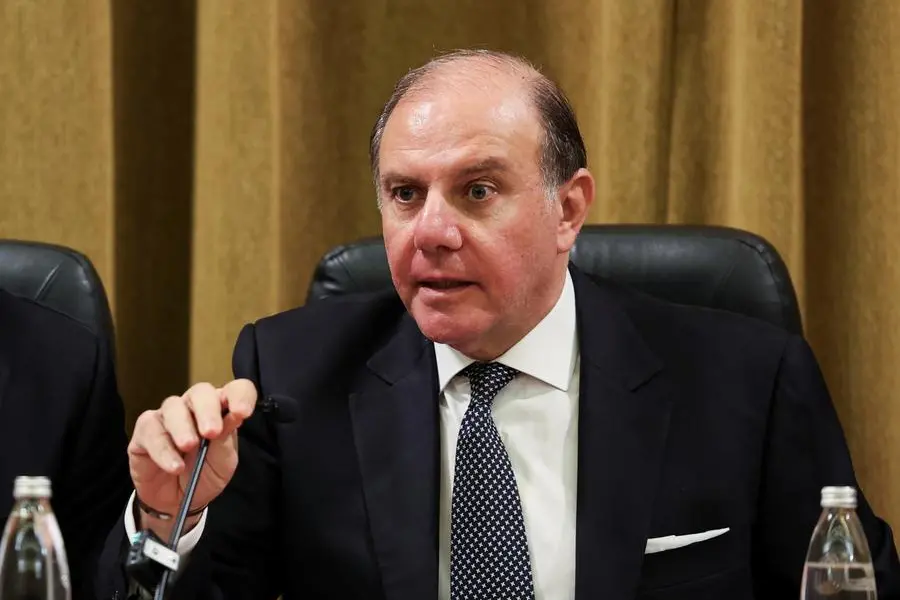PHOTO
Lebanon's new central bank governor said on Friday commercial banks must recapitalise, merge or be closed as he outlined plans for reviving the paralysed financial system, saying that small depositors would be prioritised in recovering their funds.
Karim Souaid also said the central bank would counter terrorism financing and eliminate the parallel economy as it seeks to get Lebanon removed from a global financial watchdog's "grey list" of states requiring special scrutiny.
Souaid takes over Banque du Liban with Lebanon still suffering the repercussions of a financial crisis that began in 2019, when decades of profligate spending and corruption led the state to default on its huge debt, the currency to collapse, and the banking system to seize up.
His appointment is part of a major shake-up of Lebanese officialdom that followed last year's war between Israel and the Iran-backed Hezbollah, an armed group that long had major sway over state affairs but was badly weakened by the conflict.
Souaid said the central bank would work to reschedule the public debt and pay back depositors, while calling upon private banks to gradually raise their capital by injecting fresh funds.
Those banks unable or unwilling to do so, should look to merge with other institutions. Otherwise, they would be liquidated in an orderly manner, with their licences revoked and depositors' rights protected, he said.
"The priority must be to pay the funds of the small depositors," he said. Commercial banks, BdL and the Lebanese state must bear their responsibilities in paying depositors, he added.
Losses in Lebanon's financial system as a result of the 2019 collapse are estimated at some $72 billion.
Successive governments made little to no progress in enacting reforms to revive the economy since the collapse, with vested interests widely blamed for blocking change. The World Bank in 2022 said the collapse had been orchestrated by the ruling elite that had long exploited state resources.
The new government, led by Prime Minister Nawaf Salam, has requested a programme with the International Monetary Fund, which says Lebanon needs a comprehensive strategy for rebooting its economy.
Souaid pledged to safeguard the central bank's independence from political pressure and prevent conflicts of interest.
"I will ensure that this national institution remains independent in its decision-making, shielded from interference, and grounded in the core principles of transparency and integrity," he said.
MONEY LAUNDERING
Souaid, who was appointed last week, outlined his priorities during his official handover with the outgoing acting central bank governor, Wissam Mansouri.
"The most important of these are combating money laundering and terrorist financing, and identifying and disclosing politically and financially influential individuals, their relatives, and those associated with them," he said.
The Financial Action Task Force placed Lebanon on its list of countries requiring special scrutiny last year in a move many have worried could discourage the foreign investment it needs to recover from the financial crisis.
Terrorist financing and money laundering are top concerns for the United States, which wants to prevent Hezbollah from using the Lebanese financial system and cash flows through the country to re-establish itself.
Souaid said any activity counter to the monetary and credit law, either by accepting deposits in cash or in any other manner, or by issuing loans, is by definition illegal, illegitimate, and would be shut down.
Hezbollah has long operated its own financial institution - Al-Qard Al-Hassan - which provides loans to people according to Islamic principles. It operates under a licence granted by the Lebanese government, although the U.S. Department of the Treasury has imposed sanctions on it since 2007.
Asked whether Souaid was referencing Al-Qard Al-Hassan in his comments, a central bank spokesperson declined to comment.
Souaid takes office nearly two years after long-serving governor Riad Salameh's tenure ended with his legacy stained by the financial collapse and graft charges at home and abroad, which he has denied.
(Additional reporting by Laila Bassam; Writing by Tala Ramadan, Jana Choukeir and Tom Perry; Editing by Mark Heinrich, Joe Bavier and Alex Richardson)




















